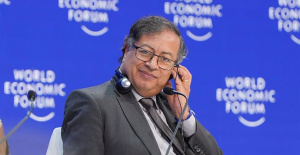The Popular Party has registered this Friday, before the Constitutional Court (TC), an extension of its amparo appeal with which it intends that the Courts do not vote on the amendments that seek to facilitate the renewal of the guarantee body itself, sources from the Group have reported Parliamentarian of the PP (GPP) in Congress.
The PP has recalled that the parliamentary groups that make up the coalition government (PSOE and Unidas Podemos) have processed the bill to repeal sedition and reduce embezzlement, "through which they intend to reform two organic laws -one of the Constitutional Court and another from the CGPJ-- via addition amendments".
In this writing, the 'popular' have attached the minutes of the meeting of the Bureau of the Congressional Justice Commission, in which it is stated that the lawyers assured that there are amendments that could "not have a material connection" in addition to not saving "minimum homogeneity relationship" with the proposed law. According to the formation led by Alberto Núñez Feijóo, the president of the Commission "ignored these warnings and rejected the request of the GPP not to include said amendments."
The 'populares' also indicate that, although the opinion of the bill was voted on in plenary session of Congress, their request for amparo was related to the parliamentary process, "for which reason the transfer of the initiative to the Senate to continue its parliamentary course does not prevent the High Court from acting".
"With this, the GPP intends to defend the fundamental rights of parliamentarians so that all guarantees are met. This is believing in the rule of law and defending it," they have claimed.
In this context, the PP has asked this Friday the Senate Board to stop the processing of the reform of the Criminal Code, which modifies the Constitutional Court, repeals the crime of sedition and changes the penalties for embezzlement, and that it will be carried out in the Upper House next Tuesday, December 20, one day after the pronouncement of the guarantee court on the request of the PP to stop the parliamentary course of the norm.
The 'popular' have requested, in a letter to which Europa Press has had access, the suspension of the processing of the bill in the Senate, using, among the arguments, the "obvious fraud of the Law" that means not processing it as a project of law to "avoid the wording of article 561 of the Organic Law of the Judiciary" and "not to collect the pertinent reports from the CGPJ, the Fiscal Council, and the Council of State."
The parliamentary group led by Javier Maroto has also criticized the urgency of the processing because, as he explained, it is "incomprehensible" that in a reform "so important for the safeguarding of our Constitutional system" its processing is prevented "in accordance with the deadlines ordinary".
However, the TC will hold an extraordinary plenary session this Monday to address the PP's request to stop the parliamentary course of the reform of the court itself.
The decision made by the president of the TC, Pedro González-Trevijano, to suspend the extraordinary plenary session that began this Thursday to continue it next Monday allowed the bill and the set of amendments that it carries to be voted on Thursday in the Congress of the Deputies.
Thus, the decision that the Constitutional Court finally takes on the very precautionary measures requested by the PP in its appeal for amparo --with which it seeks to stop the parliamentary processing of the amendments that affect the General Council of the Judiciary (CGPJ) and the TC-- will have a direct impact on the course of the bill in the Senate.

 Exploring Cardano: Inner Workings and Advantages of this Cryptocurrency
Exploring Cardano: Inner Workings and Advantages of this Cryptocurrency Seville.- Economy.- Innova.- STSA inaugurates its new painting and sealing hangar in San Pablo, for 18 million
Seville.- Economy.- Innova.- STSA inaugurates its new painting and sealing hangar in San Pablo, for 18 million Innova.- More than 300 volunteers join the Andalucía Compromiso Digital network in one month to facilitate access to ICT
Innova.- More than 300 volunteers join the Andalucía Compromiso Digital network in one month to facilitate access to ICT Innova.-AMP.- Ayesa acquires 51% of Sadiel, which will create new technological engineering products and expand markets
Innova.-AMP.- Ayesa acquires 51% of Sadiel, which will create new technological engineering products and expand markets COMUNICADO: Energy Transitions Commission (ETC) Urges Government and Industry Collaboration to Overcome Perceptions of Offshore Wind
COMUNICADO: Energy Transitions Commission (ETC) Urges Government and Industry Collaboration to Overcome Perceptions of Offshore Wind UGT and CCOO demand the regeneration of democracy, better salaries and a reduction in working hours
UGT and CCOO demand the regeneration of democracy, better salaries and a reduction in working hours Alcaraz gives up his reign in Madrid against Rublev
Alcaraz gives up his reign in Madrid against Rublev Petro announces that Colombia will break diplomatic relations with Israel
Petro announces that Colombia will break diplomatic relations with Israel How Blockchain in being used to shape the future
How Blockchain in being used to shape the future Not just BTC and ETH: Here Are Some More Interesting Coins Worth Focusing on
Not just BTC and ETH: Here Are Some More Interesting Coins Worth Focusing on Ivace and promotes a less invasive device for the early detection of prostate cancer
Ivace and promotes a less invasive device for the early detection of prostate cancer Valencia unanimously approves the ordinance to allocate spaces to test innovative initiatives
Valencia unanimously approves the ordinance to allocate spaces to test innovative initiatives UPV researchers promote a paid master's degree as a "talent factory" in integrated photonics
UPV researchers promote a paid master's degree as a "talent factory" in integrated photonics A spin-off of the UV works on obtaining high-resolution 3D biomedical images in real time
A spin-off of the UV works on obtaining high-resolution 3D biomedical images in real time A million people demonstrate in France against Macron's pension reform
A million people demonstrate in France against Macron's pension reform Russia launches several missiles against "critical infrastructure" in the city of Zaporizhia
Russia launches several missiles against "critical infrastructure" in the city of Zaporizhia A "procession" remembers the dead of the Calabria shipwreck as bodies continue to wash up on the shore
A "procession" remembers the dead of the Calabria shipwreck as bodies continue to wash up on the shore Prison sentences handed down for three prominent Hong Kong pro-democracy activists
Prison sentences handed down for three prominent Hong Kong pro-democracy activists ETH continues to leave trading platforms, Ethereum balance on exchanges lowest in 3 years
ETH continues to leave trading platforms, Ethereum balance on exchanges lowest in 3 years Investors invest $450 million in Consensys, Ethereum incubator now valued at $7 billion
Investors invest $450 million in Consensys, Ethereum incubator now valued at $7 billion Alchemy Integrates Ethereum L2 Product Starknet to Enhance Web3 Scalability at a Price 100x Lower Than L1 Fees
Alchemy Integrates Ethereum L2 Product Starknet to Enhance Web3 Scalability at a Price 100x Lower Than L1 Fees Mining Report: Bitcoin's Electricity Consumption Declines by 25% in Q1 2022
Mining Report: Bitcoin's Electricity Consumption Declines by 25% in Q1 2022 Oil-to-Bitcoin Mining Firm Crusoe Energy Systems Raised $505 Million
Oil-to-Bitcoin Mining Firm Crusoe Energy Systems Raised $505 Million Microbt reveals the latest Bitcoin mining rigs -- Machines produce up to 126 TH/s with custom 5nm chip design
Microbt reveals the latest Bitcoin mining rigs -- Machines produce up to 126 TH/s with custom 5nm chip design Bitcoin's Mining Difficulty Hits a Lifetime High, With More Than 90% of BTC Supply Issued
Bitcoin's Mining Difficulty Hits a Lifetime High, With More Than 90% of BTC Supply Issued The Biggest Movers are Near, EOS, and RUNE during Friday's Selloff
The Biggest Movers are Near, EOS, and RUNE during Friday's Selloff Global Markets Spooked by a Hawkish Fed and Covid, Stocks and Crypto Gain After Musk Buys Twitter
Global Markets Spooked by a Hawkish Fed and Covid, Stocks and Crypto Gain After Musk Buys Twitter Bitso to offset carbon emissions from the Trading Platform's ERC20, ETH, and BTC Transactions
Bitso to offset carbon emissions from the Trading Platform's ERC20, ETH, and BTC Transactions Draftkings Announces 2022 College Hoops NFT Selection for March Madness
Draftkings Announces 2022 College Hoops NFT Selection for March Madness



























